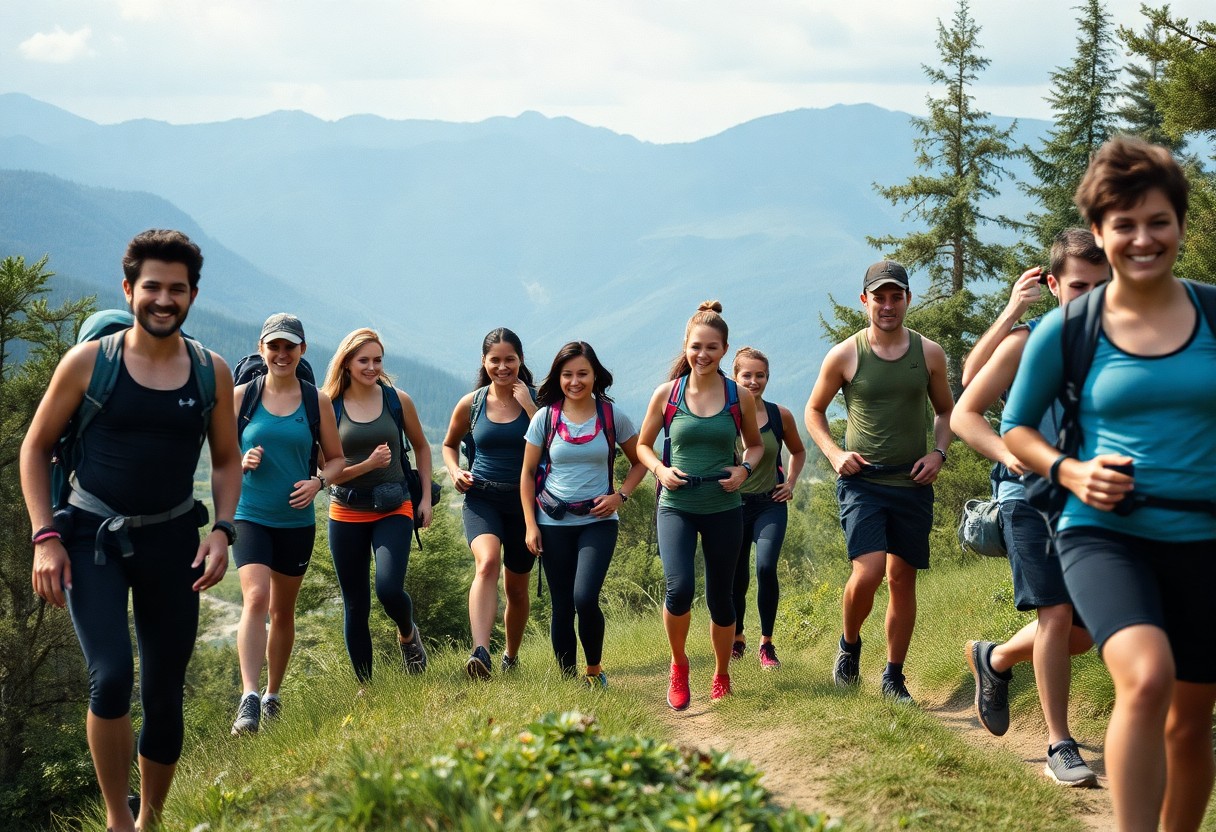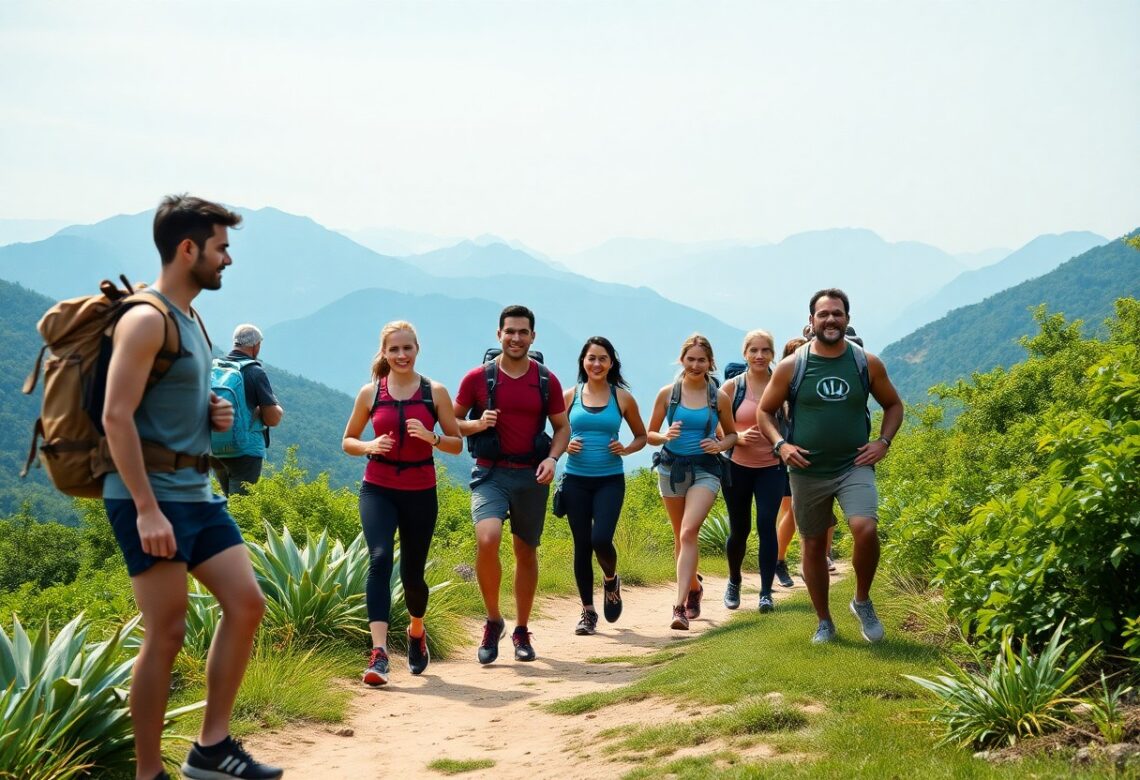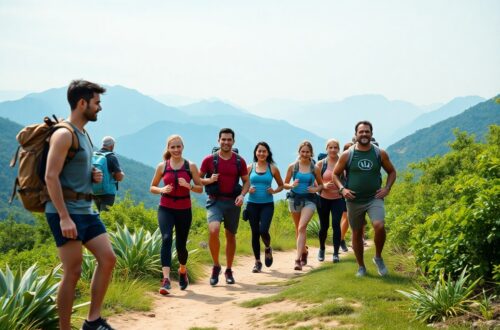It’s no secret that hiking can greatly improve your fitness and help with weight loss. By exploring nature while getting a workout, you engage your muscles and boost your heart health. Hiking is simple and can fit into your routine, making it an excellent exercise choice for everyone. In this blog post, you’ll discover how hiking not only supports your physical fitness but also enhances your overall well-being, making it a fantastic way to reach your health goals.
Key Takeaways:
- Hiking combines cardio and strength training, helping to burn calories and build muscle, which can assist with weight loss.
- Being in nature during hikes can improve mental health, reduce stress, and boost motivation to stay active.
- It’s an accessible activity for most fitness levels, making it easy for anyone to start and gradually improve their fitness.
The Physical Benefits of Hiking
A hike is more than just a walk in the woods. It serves as an excellent way to improve your overall physical health. Hiking can aid in weight loss, boost your stamina, and enhance your mood. As you navigate various terrains, you engage different muscle groups, leading to better fitness levels. Whether you opt for steep hills or flat trails, you can expect distinct physical benefits that contribute to your health journey.
Cardiovascular Health
Any time you hike, you put your heart to work. This activity helps raise your heart rate, which enhances circulation and strengthens your heart over time. Regular hiking can reduce your risk of heart disease and improve your endurance. Studies have shown that people who hike regularly experience better cardiovascular fitness than sedentary individuals. Each step you take can contribute to a healthier heart!
Building Muscle Strength
Before hitting the trail, know that hiking is an effective way to build muscle strength. As you walk uphill or navigate rocky paths, your leg muscles, back, and core all engage. This not only tones your muscles but also improves your balance and agility. In essence, hiking provides a full-body workout that is both enjoyable and rewarding.
With each hike, you challenge your body in new ways. This engagement is beneficial because muscles grow when they are used. As you hike regularly, you’ll notice increased muscle tone and strength in your legs and core. Besides, carrying a backpack adds extra weight, enhancing the workout for your upper body. It’s an enjoyable way to strengthen your body while exploring nature.
How Hiking Aids in Weight Loss
The benefits of hiking for weight loss go beyond just being active. This enjoyable outdoor activity helps you shed pounds while also improving your overall fitness. As you navigate different terrains, you challenge your body, which leads to increased calorie burn and a healthier metabolic rate. Plus, hiking can be a fun way to stay consistent in your fitness journey, making it easier to reach your weight loss goals.
Burning Calories
After you step onto the trail, your body starts to burn calories effectively. Hiking can burn around 400 to 700 calories per hour, depending on your weight and the trail’s difficulty. As you climb hills and explore varied landscapes, your heart rate increases, leading to even more calories burned. This means that the more you hike, the more weight you can potentially lose.
Boosting Metabolism
Beside helping you burn calories during your hike, this activity boosts your metabolism even after you finish. Engaging in hiking strengthens your muscles, which helps your body burn more calories at rest. A higher muscle mass increases your resting metabolic rate, meaning you’ll burn more calories just by going about your daily activities. Additionally, studies show that aerobic activities like hiking can keep your metabolism elevated for hours after you finish exercising.
Weight training is another effective way to boost your metabolism. However, hiking naturally involves both aerobic and strength components. As you navigate various terrains, you build strength in your legs, core, and even your upper body. By combining these elements, hiking provides a comprehensive workout that encourages fat loss while increasing your metabolism. So, the more you hike, the better your body gets at burning calories throughout the entire day.

Mental Health Benefits of Hiking
Keep in mind that hiking is not just about physical fitness; it also offers significant mental health benefits. Spending time in nature can help improve your overall well-being. When you hike, you give your mind a break from everyday stressors. The combination of fresh air, beautiful scenery, and physical activity can uplift your spirit and enhance your mental clarity. So, lace up your hiking boots and hit the trails for a better state of mind.
Reducing Stress
By connecting with nature through hiking, you can effectively reduce stress levels. Studies show that spending time outdoors can lower your cortisol levels, which are linked to stress. The act of walking in a calming environment allows you to escape from daily pressures. As you breathe in the fresh air and move through the landscape, you’ll find a chance to clear your mind and relax.
Enhancing Mood
Along with reducing stress, hiking can significantly enhance your mood. The physical activity involved releases endorphins, often called “feel-good” hormones. These chemicals can help combat feelings of anxiety and depression. Regular hikes can lead to sustained improvements in your overall happiness and mental resilience. As you explore new trails, you not only boost your fitness but also cultivate a more positive outlook on life.
Benefits of hiking for your mood are supported by data, as research shows that just a 30-minute hike can elevate your mood levels considerably. The combination of exercise and nature exposure helps to fight off feelings of sadness and fatigue. So, the next time you need a mental pick-me-up, consider hitting the trails. It’s a simple yet powerful way to boost your happiness and maintain a positive mindset.

Getting Started with Hiking
Not everyone knows how easy it is to start hiking. You can probe this enjoyable activity without spending a lot of time or money. First, learn about the benefits of hiking. It can improve your fitness and help with weight loss. You can check out 5 Powerful Ways Hiking Regularly Can Help Transform your well-being. All you need to do is find a trail and get moving!
Choosing the Right Trail
Before you lace up your shoes, it is important to pick the right trail. Start with easier paths if you are a beginner. These trails must align with your fitness level and interests. You can always challenge yourself later.
Essential Gear and Safety Tips
Any hiking adventure is better when you’re prepared. Having the right gear will keep you safe and comfortable. Here are some importants:
- Good hiking shoes or boots
- Water and snacks
- Weather-appropriate clothing
- First aid kit
- Map or GPS device
Recognizing these key items will make your hiking experience more enjoyable.
Tips for staying safe while hiking include keeping your phone charged, hiking with a friend, and knowing your limits. Here’s a quick list:
- Check the weather before you go
- Stay on marked trails
- Share your travel plans with someone
- Be aware of wildlife
Recognizing potential hazards will keep you safe during your hikes.

Making Hiking a Habit
All it takes to make hiking a part of your routine is consistency. Start by choosing specific days each week to explore local trails. Even short hikes count, and they can easily fit into your schedule. Aim for a variety of trails to keep things interesting and challenge yourself. By sticking to a plan, you will not only improve your fitness but also look forward to these outdoor adventures.
Setting Goals
With clear goals, you can stay motivated on your hiking journey. Start by deciding how often you want to hike each month. Perhaps you want to complete a certain number of miles or explore different parks. Setting these goals gives you a target to work towards. Track your progress to see how far you’ve come, which can be very rewarding.
Finding a Hiking Community
Behind every great hike is a supportive community. Connecting with others who enjoy hiking can enhance your experience. Groups can keep you motivated and provide tips about local trails. Consider joining hiking clubs or social media groups focused on hiking in your area.
Finding a hiking community is easier than you think. Look for local clubs or online groups where you can meet fellow hikers. Many areas have organized hikes that you can join. You can share experiences, discover new trails, and get advice from more experienced hikers. Being part of a community can make hiking more enjoyable and help you stick to your fitness goals.
Nutrition and Hydration for Hikers
For a successful hiking adventure, proper nutrition and hydration are key. Your body needs energy for the trail, and the right foods can fuel your journey. Aim for a balanced diet that includes carbs, proteins, and healthy fats. Foods like whole grains, lean meats, nuts, and fruits provide the nutrients you need to stay energized and focused. Don’t forget to snack during your hike; it keeps your energy levels up and your spirits high.
Pre-Hike Nutrition
Behind every great hike is a good meal. Before you hit the trail, eat a meal rich in carbohydrates to boost your energy levels. Options like oatmeal, whole-grain bread, or fruit smoothies can set you up for success. Pairing these with some protein, like yogurt or eggs, can help keep you feeling full. Eating well doesn’t just fuel your hike; it also enhances your performance and enjoyment.
Staying Hydrated on the Trail
To stay at your best while hiking, hydration is necessary. Always carry enough water to keep yourself hydrated throughout your trek. A good rule of thumb is to drink about half a liter of water every hour while hiking. If you’re in hot weather or climbing steep trails, you may need more. This will help you avoid fatigue and maintain your energy levels.
Even slight dehydration can slow you down. Pay attention to your body and drink before you feel thirsty. You can also add electrolytes to your water for a boost, especially during long hikes. Look for hydration packs that make drinking easy while you walk. Staying hydrated keeps you sharp and ready to enjoy every part of the trail!
Conclusion
As a reminder, hiking is not just a fun outdoor activity; it can significantly improve your fitness and help you lose weight. By incorporating regular hikes into your routine, you can boost your stamina, enhance your strength, and enjoy the benefits of nature. Whether you choose easy trails or challenging terrains, each step you take brings you closer to your fitness goals. So, lace up your hiking boots and start exploring—your body will thank you!
How Hiking Can Transform Your Fitness and Aid in Weight Loss
Hiking is more than just a great way to enjoy nature. It can also be a powerful tool for improving your fitness and helping you lose weight. In this blog post, we will explore how hiking benefits your body and mind, why it is an effective workout, and how you can get started.
Experience the Benefits of Hiking
Hiking is a unique way to exercise. You get to connect with nature while also giving your body a workout. Here are some benefits of hiking:
– Burns Calories: Hiking can burn a significant number of calories, especially if you choose a steep trail.
– Builds Muscle: Walking on different terrains works various muscle groups. You’ll strengthen your legs, core, and even your arms if you use trekking poles.
– Improves Heart Health: Hiking is a cardio workout that raises your heart rate, helping improve your cardiovascular fitness.
– Enhances Mood: Spending time outdoors can reduce stress and improve your mental health. Nature has a calming effect that promotes happiness.
By experiencing these benefits, you can see how hiking is not only enjoyable but also a great way to get fitter.
Expertise in Hiking Techniques
To make the most of your hiking experience, consider the following tips:
1. Choose the Right Trail: Start with beginner-friendly trails if you are new. Gradually progress to more challenging hikes.
2. Wear Proper Gear: Use supportive shoes and comfortable clothing. A good pair of hiking boots can make a big difference.
3. Stay Hydrated: Drink water before, during, and after your hike. Staying hydrated helps your body function better.
4. Pace Yourself: Begin with a slow pace. Focus on your breathing and enjoy the surroundings.
By following these expert tips, you can hike safely and effectively.
Authoritativeness of Hiking for Fitness
Research shows that hiking is an effective way to improve fitness. According to various fitness studies:
– Weight Management: Regular hiking can help maintain a healthy weight. Combining it with a balanced diet can enhance weight loss efforts.
– Energy Levels: Hiking can boost your energy. You’ll feel more active and alert throughout the day.
Due to its proven benefits, hiking is recognized by fitness experts as a top choice for physical activity.
Building Trust through Safety and Community
When hiking, safety should be a top priority. Here are some tips to ensure a safe hiking experience:
– Let Someone Know: Always tell a friend or family member where you are going and when you expect to return.
– Be Aware of Your Surroundings: Pay attention to the trail, weather, and any wildlife.
– Join a Group: Hiking with others can make the experience safer and more enjoyable.
Connecting with a hiking community can also provide support and motivation.
Key Takeaways
– Hiking is a fun and effective workout that helps with fitness and weight loss.
– Choose trails appropriate for your skill level and always wear the right gear.
– Stay hydrated and pace yourself during hikes.
– Hiking not only builds physical strength but can also improve mental health.
– Prioritize safety and consider hiking with a group for added support.
By making hiking a regular part of your routine, you can enjoy a healthier lifestyle while exploring the beauty of nature.
FAQ
Q: How many calories can I burn while hiking?
A: The number of calories burned depends on your weight, the difficulty of the trail, and how long you hike. On average, a person can burn between 400 to 700 calories during a 2-hour hike.
Q: Do I need special equipment to start hiking?
A: You don’t need special equipment to start hiking. A sturdy pair of hiking shoes and comfortable clothes are usually enough. As you become more serious, you might want to invest in hiking gear.
Q: Is hiking suitable for beginners?
A: Yes, hiking is suitable for beginners. Start with easy trails and gradually work your way up to more difficult ones. Always listen to your body and take breaks when needed.
Q: How often should I hike to see results in fitness and weight loss?
A: Aim to hike at least once a week. Consistency is key. Combine hiking with other forms of exercise for best results.
Q: Can hiking improve my mental health?
A: Absolutely! Hiking can reduce stress, improve your mood, and boost mental well-being. Being in nature has a positive effect on your mental health.



